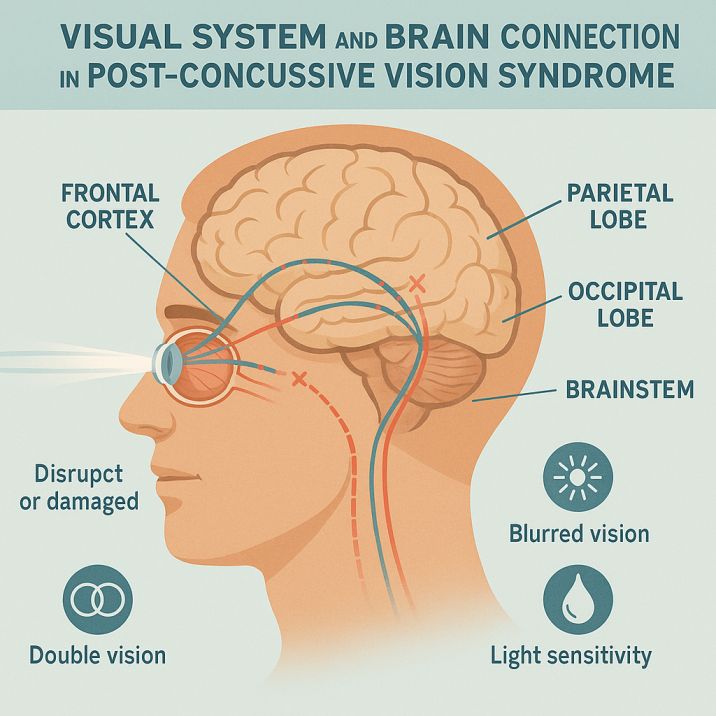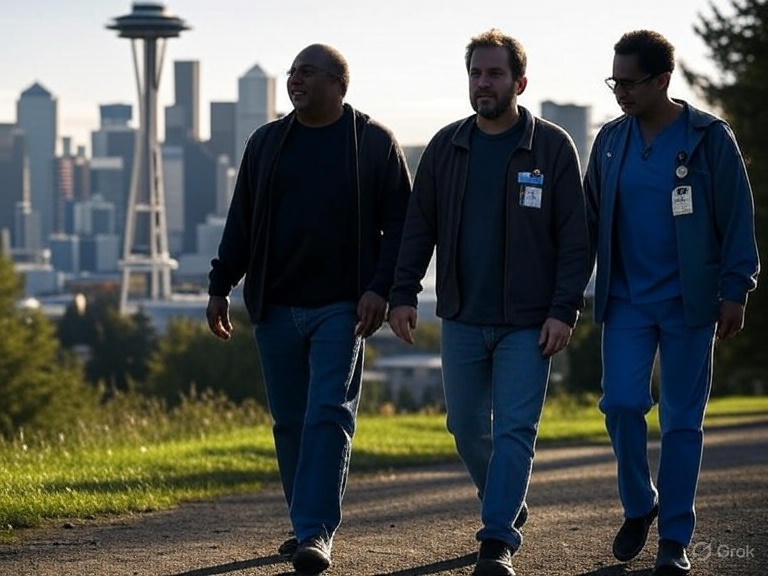Post-Concussive Vision Syndrome: Diagnosis and Treatment
Bottom Line Up Front: Post-Concussive Vision Syndrome affects up to 90% of concussion patients, causing persistent vision problems that can disrupt work, school, and daily activities for months or years. At Cannon EyeCare in Seattle, our specialized Post-Concussive Vision Syndrome treatment combines comprehensive diagnostics with evidence-based vision therapy to restore your visual function and quality of life.
Understanding Post-Concussive Vision Syndrome
Post-Concussive Vision Syndrome (PCVS), also known as Post-Traumatic Vision Syndrome, represents a complex constellation of visual symptoms that persist after a concussion or mild traumatic brain injury. Unlike a simple eye injury, Post-Concussive Vision Syndrome occurs when the neural pathways connecting your eyes to your brain become disrupted, leading to communication breakdowns that affect how you process visual information.
The condition is remarkably common yet often overlooked. Research indicates that approximately 90% of concussion patients experience some form of visual symptoms in the early recovery period, with 15-30% developing persistent symptoms that last months or even years without proper treatment.
How Concussions Affect Your Visual System
Your visual system is incredibly complex, involving multiple brain regions that process different aspects of sight. When a concussion occurs, the sudden movement of your brain within the skull can damage these delicate neural networks. The visual processing system requires approximately 70% of your brain’s resources, making it particularly vulnerable to injury.
The most commonly affected areas include:
- Convergence and accommodation systems that control eye focusing and teaming
- Saccadic eye movements are responsible for tracking and scanning
- Smooth pursuit mechanisms that follow moving objects
- Visual-vestibular integration that coordinates vision with balance
Recognizing the Symptoms of Post-Concussive Vision Syndrome
Many patients don’t immediately connect their vision problems to their previous concussion, especially when Post-Concussive Vision Syndrome symptoms develop gradually or appear weeks after the initial injury. Understanding these warning signs can expedite proper diagnosis and treatment.
Primary Visual Symptoms
Focusing and Clarity Issues:
- Blurred vision that comes and goes, especially during near tasks
- Difficulty switching focus between near and far objects
- Double vision (diplopia) that may be constant or intermittent
- Visual fatigue after short periods of reading or computer work
- Difficulty tracking moving objects smoothly
- Losing your place while reading
- Skipping lines or words during reading tasks
- Eyes that feel “jumpy” or unstable
Light and Motion Sensitivity:
- Increased sensitivity to bright lights or fluorescent lighting
- Discomfort in busy visual environments like grocery stores
- Headaches triggered by screen time or reading
- Sensitivity to motion in your peripheral vision
Secondary Symptoms Often Related to Vision Problems
- Headaches that worsen with visual tasks
- Dizziness or balance problems, particularly in visually complex environments
- Concentration difficulties during reading or computer work
- Fatigue that seems disproportionate to activity level
- Neck pain from compensating for vision problems
The Science Behind Post-Concussive Vision Syndrome
Recent research has dramatically improved our understanding of how concussions affect visual processing. Studies using advanced eye-tracking technology show that even when standard eye exams appear normal, subtle but significant dysfunction persists in patients with Post-Concussive Vision Syndrome.
Key Research Findings
Research consistently shows that 82% of post-concussion patients are diagnosed with oculomotor dysfunction when examined by specialists, despite many having “normal” vision according to basic eye tests. Studies indicate that up to 69% of concussion patients have ocular dysfunction, including eye movement defects. The most common issues identified include:
- Convergence insufficiency: Difficulty getting both eyes to work together for near tasks
- Accommodative insufficiency: Problems with eye focusing and flexibility
- Saccadic dysfunction: Impaired rapid eye movements used for reading and tracking
The Neuroplasticity Factor
The encouraging news is that the brain’s remarkable ability to adapt and heal—called neuroplasticity—means that vision problems after concussion are often treatable. With proper intervention, new neural pathways can be developed to bypass damaged areas and restore normal visual function.
Comprehensive Diagnosis at Cannon EyeCare
At Cannon EyeCare, we understand that diagnosing Post-Concussive Vision Syndrome requires more than a standard eye exam. Our Cannon EyeCare specialists use a comprehensive approach that evaluates not just your visual acuity, but how well your entire visual system functions as an integrated unit.
Our Specialized Testing Protocol
Detailed Medical History: We begin by thoroughly documenting your concussion history, symptoms, and how they impact your daily activities. This includes understanding the mechanism of injury, the timeline of symptom development, and previous treatments attempted.
Advanced Visual Function Testing:
- Convergence testing: Measuring how well your eyes work together at different distances
- Accommodation assessment: Evaluating your eyes’ focusing flexibility and endurance
- Saccadic eye movement analysis: Testing rapid eye movements crucial for reading and scanning
- Smooth pursuit evaluation: Assessing your ability to track moving objects
- Vestibulo-ocular reflex testing: Examining how your eyes and balance system coordinate
Specialized Diagnostic Tools: Our state-of-the-art equipment allows us to detect subtle vision problems that standard tests might miss, providing objective measurements of your visual function.
Why Standard Eye Exams Miss Post-Concussive Vision Syndrome
Traditional eye exams focus primarily on visual acuity—how well you can see letters on a chart. While this is important, it represents only a small fraction of your visual capabilities. Post-Concussive Vision Syndrome typically involves complex dysfunctions that require specialized testing:
- Binocular vision dysfunction: How well your two eyes work together
- Dynamic visual processing: How your vision functions during movement and activity
- Visual-cognitive integration: How your brain processes and interprets visual information
These complex functions require specialized testing that goes far beyond reading an eye chart.
Evidence-Based Treatment Options
Treatment for Post-Concussive Vision Syndrome has evolved significantly, with multiple therapeutic approaches showing excellent success rates when properly applied by specialists like those at Cannon EyeCare.
Vision Therapy: The Gold Standard for Post-Concussive Vision Syndrome
Vision therapy represents the most effective treatment for most Post-Concussive Vision Syndrome cases. This personalized program uses a series of progressive exercises and activities designed to retrain the visual system and strengthen the communication between your eyes and brain.
Research-Backed Success Rates: Based on a comprehensive study published in Optometry and Vision Science (2017), vision therapy shows excellent outcomes for post-concussion vision problems:
- 85% of patients with convergence insufficiency achieved complete resolution after vision therapy, with 15% showing significant improvement
- 33% of patients with accommodative problems achieved complete resolution, with 67% showing significant improvement
- Overall, 100% of patients who completed vision therapy experienced either successful treatment or meaningful improvement
Our Comprehensive Vision Therapy Program
In-Office Sessions: Typically conducted 1-2 times per week, these supervised sessions use specialized equipment and techniques, including:
- Prism lenses to retrain eye alignment and reduce double vision
- Computer-based programs that challenge and strengthen visual processing
- Balance integration activities that coordinate vision with vestibular function
- Therapeutic filters and lenses to reduce light sensitivity
Home-Based Exercises: Customized activities that reinforce in-office training, ensuring consistent progress between sessions.
Progress Monitoring: Regular reassessments track improvement and adjust treatment protocols as needed.
Specialized Lens Solutions
For many patients, therapeutic lenses provide immediate relief while vision therapy addresses underlying problems:
Prism Lenses: These specially designed lenses can eliminate double vision and reduce eye strain by helping align visual input from both eyes.
Tinted Lenses (FL-41): Rose-colored lenses that filter specific wavelengths of light, providing relief from photophobia and migraine triggers.
Blue Light Filtering: Specialized coatings that reduce digital eye strain and improve comfort during screen time.
The Seattle Advantage: Why Location Matters
Living and working in Seattle presents unique visual challenges that make proper post-concussion vision care even more critical.
Environmental Factors in Seattle
Weather and Light Conditions: Seattle’s frequent overcast skies followed by sudden bright sunshine can be particularly challenging for those with post-concussive light sensitivity. The constant adjustment between light levels can trigger symptoms and fatigue.
Technology Hub Impact: As a major tech center, Seattle professionals often spend extensive time on computers and digital devices. Post-concussive vision problems can make these essential work tasks extremely difficult without proper treatment.
Active Lifestyle Integration: Seattle’s outdoor culture—from hiking to water sports—requires excellent visual function and spatial awareness. Untreated post-concussive vision problems can significantly impact safety during these activities.
Recovery Timeline and Expectations
Understanding what to expect during recovery helps set realistic goals and maintain motivation throughout treatment.
Typical Recovery Phases
Immediate Post-Concussion (0-4 weeks): Most patients experience significant visual symptoms during this period. Research shows that approximately 90% of concussion patients experience visual symptoms in the early days following injury. For most, these symptoms resolve within 4 weeks, though rest and limiting visual demands are typically recommended.
Subacute Phase (4-12 weeks): This is often the optimal time to begin vision therapy, as the brain is most responsive to rehabilitation efforts during this window.
Chronic Phase (3+ months): Even patients with long-standing symptoms can achieve significant improvement with proper treatment, though recovery may take longer.
Factors Affecting Recovery
Age and Overall Health: Younger patients typically recover faster, though patients of all ages can achieve meaningful improvement.
Severity and Number of Concussions: Multiple concussions or more severe initial injuries may require longer treatment periods.
Early Intervention: Starting treatment sooner generally leads to better outcomes and faster recovery.
Compliance with Treatment: Consistent participation in vision therapy and following through with home exercises significantly impacts success rates.
Advanced Treatment Approaches
For patients with complex or persistent symptoms, advanced treatment options may be recommended.
Neuro-Optometric Rehabilitation
This comprehensive approach addresses not just vision problems, but also how vision integrates with other sensory systems:
Vestibular-Visual Integration: Specialized exercises that retrain the coordination between your balance system and vision.
Cognitive-Visual Processing: Activities that strengthen the brain’s ability to process and interpret visual information quickly and accurately.
Spatial Awareness Training: Exercises that improve your ability to judge distances and navigate through space safely.
Collaborative Care Approach
At Cannon EyeCare, we understand that post-concussive vision syndrome often requires a multidisciplinary approach. We maintain relationships with:
- Neurologists for complex concussion management
- Physical therapists specializing in vestibular rehabilitation
- Occupational therapists for cognitive and daily living skills
- Sports medicine physicians for return-to-activity protocols
Living with Post-Concussive Vision Syndrome: Practical Tips
While pursuing professional treatment, these strategies can help manage symptoms in daily life:
Work and School Accommodations
Computer and Screen Use:
- Increase font sizes and adjust screen brightness
- Take frequent breaks (20-20-20 rule: every 20 minutes, look at something 20 feet away for 20 seconds)
- Use blue light filtering glasses or screen filters
- Position screens to minimize glare and reflections
Reading Strategies:
- Use a ruler or paper to track lines while reading
- Choose larger print books when possible
- Ensure adequate lighting without glare
- Take breaks frequently to prevent visual fatigue
Environmental Modifications:
- Reduce fluorescent lighting when possible
- Wear sunglasses outdoors and in bright indoor environments
- Avoid visually busy or overwhelming environments when symptoms are active
- Plan activities during times when symptoms are typically better (often mornings)
Exercise and Activity Guidelines
Gradual Return to Activity: Work with your healthcare team to develop a progressive return to normal activities, including:
- Light aerobic exercise can alleviate symptoms.
- Gradual reintroduction of sports and recreational activities
- Careful monitoring of symptom response to increased activity levels
When to Seek Immediate Care
While Post-Concussive Vision Syndrome is not typically a medical emergency, certain symptoms warrant immediate evaluation:
- Sudden onset of severe double vision
- Dramatic worsening of symptoms
- New neurological symptoms, such as weakness or confusion
- Severe headaches are different from typical post-concussion headaches
The Cannon EyeCare Difference for Post-Concussive Vision Syndrome
What sets Cannon EyeCare apart in treating Post-Concussive Vision Syndrome is our combination of advanced diagnostic capabilities, evidence-based treatment approaches, and genuine Midwestern care in the heart of Seattle. Our Cannon EyeCare team specializes specifically in post-concussion vision rehabilitation.
Our Specialized Expertise
Our doctors have extensive training in post-concussion vision care, staying current with the latest research and treatment techniques. We understand that each patient’s recovery journey is unique and requires personalized attention.
Convenient Seattle Locations
With offices in both Pike Place Market and University Village, we make it easy for Seattle-area patients to access specialized care close to home or work.
Our Pricing and Insurance Information
Comprehensive Eye Exam Costs:
- Standard comprehensive eye exam: $225
- Eye exam with contact lens fitting: $345 (price may vary)
- Costs are typically much lower with insurance coverage
- Many insurance providers cover annual eye exams fully
Insurance Coverage: Cannon EyeCare is in-network with major insurance providers, including:
- Premera, Regence, Uniform Medical, HMA, Lifewise
- Medicare and Blue Cross/Blue Shield
- Kaiser Permanente’s PPO plans
Note: We do not accept independent vision plans such as VSP, Eyemed, Davis Vision, or Spectera due to contractual limitations.
Vision Therapy Investment: Vision therapy costs vary based on individual treatment plans. We work with patients to maximize insurance benefits and provide information for flexible spending accounts. Contact our office for specific pricing information tailored to your needs.
Take the Next Step Toward Recovery
Post-Concussive Vision Syndrome doesn’t have to limit your life indefinitely. With proper diagnosis and treatment at Cannon EyeCare, most patients achieve significant improvement in their symptoms and quality of life.
At Cannon EyeCare, we’re committed to helping Seattle-area patients overcome the challenges of Post-Concussive Vision Syndrome with compassionate, expert care. Our Cannon EyeCare combination of advanced diagnostic technology, evidence-based treatments, and personalized attention provides the best possible foundation for your recovery.
Ready to start your journey back to clear, comfortable vision?
Contact Cannon EyeCare today to schedule your comprehensive Post-Concussive Vision Syndrome evaluation:
- Pike Place Market Location: (206) 448-7739
- University Village Location: (206) 522-9323
Don’t let Post-Concussive Vision Syndrome continue to impact your work, relationships, and quality of life. Take the first step toward recovery today.
FAQs
-
Post-Concussive Vision Syndrome is a group of vision problems that occur after a concussion, including blurry vision, double vision, and trouble focusing



